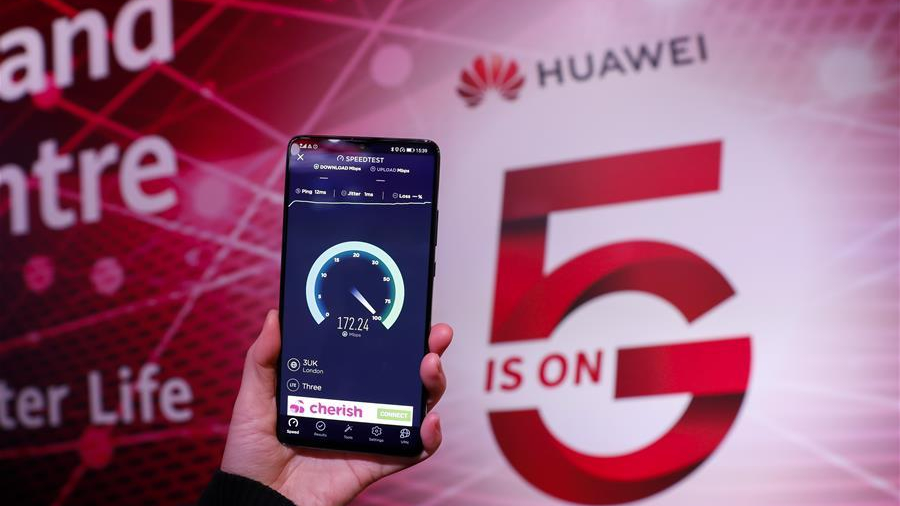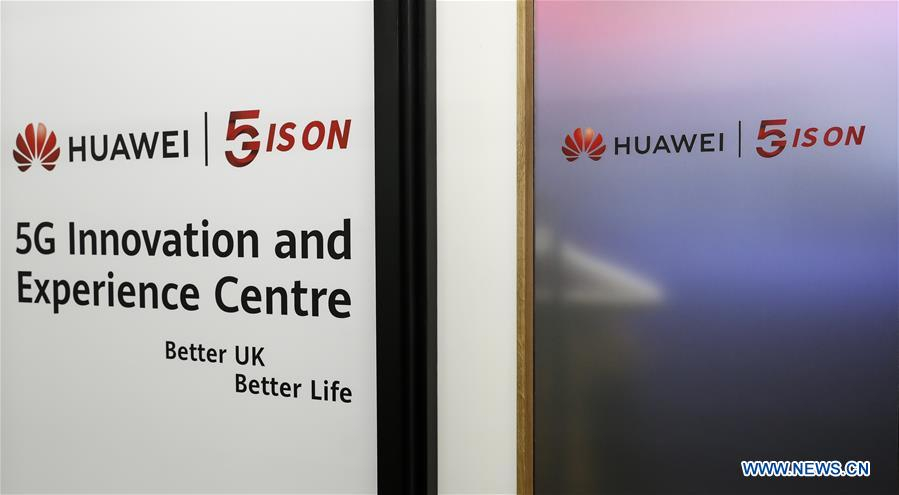
Testing the speed with a Huawei 5G mobile phone at Huawei 5G Innovation and Experience Center in London, Britain, January. 28, 2020. /Xinhua Photo
Testing the speed with a Huawei 5G mobile phone at Huawei 5G Innovation and Experience Center in London, Britain, January. 28, 2020. /Xinhua Photo
Editor's note: Tom Fowdy is a British political and international relations analyst and a graduate of Durham and Oxford universities. He writes on topics pertaining to China, the DPRK, Britain, and the U.S. The article reflects the author's opinions, and not necessarily the views of CGTN.
On Tuesday, the government of Boris Johnson formally approved the role of Chinese telecommunications firm Huawei in the construction of Britain's 5G network, albeit with the restrictions of its participation only in the "Peripheral" and not "core" elements of the network and with a capped usage of 35 percent.
The move, which was a de-facto continuation of a decision made by Theresa May last year, came despite relentless pressure from the United States for Britain to ban the company from its next generation networks, with threats placed against London from the White House and members of Congress.
However, in a decision which was not surprising to close observers, Boris Johnson publicly rejected their calls having stated on multiple occasions that there was "no alternative" being offered, and he wanted the British people to have access to the "best possible technology," while British security services rejected claims that any risk was unmanageable and worthy of a ban.
The media describe the move as having been the first real post Brexit-test for the Prime Minister's strategy, and highlight it as a major snub to the United States, with former House of Representatives speaker Newt Gingrich branding it a "massive strategic defeat" for Washington.
In two days' time, Britain will formally leave the European Union. The reluctance of the UK to follow suit with what is often deemed "its closest ally" is a clear indicator as to how its foreign policy outlook is shifting in a changing world. Once having been tight-knit with America on absolutely everything, the growing importance of China as an economic partner is seeing Britain move towards a strategy of "hedging" where it perceives its best interests can be better sustained in balancing between both powers, rather than leaning completely to one side.
Thus, Washington has to come to terms with the fact that its absolute hegemony is over, and that protesting and making threats cannot change this new reality.

Huawei 5G Innovation and Experience Center in London, Britain, January 28, 2020. /Xinhua Photo
Huawei 5G Innovation and Experience Center in London, Britain, January 28, 2020. /Xinhua Photo
Seventeen years ago, the United Kingdom went to war in Iraq with the United States in a regime change operation. The invasion was a bilateral move, which was technically illegal under international law, having not been approved by the United Nations.
The conflict was illustrative of the "special relationship" between London and Washington, showing that the two sides stood with each other no matter what. Tony Blair's government was willing to play along with the dubious and misleading "intelligence" presented by the George W. Bush administration and lent their support in perpetuating those falsehoods.
Yet now, things are different. The United Kingdom just rejected arm-twisting pressure from Washington to ban a Chinese company from participating in their 5G networks, with open objections in public. It is not the first rejection of this kind either; London previously ignored the Obama administration's call to boycott the Asian International Infrastructure Bank (AIIB).
Why the change? Because as China's role in the world economy is growing, Britain as a smaller country has come to the conclusion that sustaining open and thriving commercial ties with Beijing is in the international interest. Washington is no longer the only option.
Thus, despite the obvious absurdity and great power nostalgia embedded in Brexit, in practice Britain recognizes that it no longer rules the waves. It is influential of course, but small. It identifies itself increasingly as a smaller country locked in between two larger powers, both of which serve its interests in different ways.
Facing a weak economy and isolation from Europe, Downing Street recognizes that unequivocal alignment with the United States will not guarantee all of Britain's national interests, but hurt it.
With the Trump administration making many demands but offering nothing, there is more to gain from delicately balancing the U.S. and China. A Huawei ban would have cost the UK billions and set back its network development, it was not worth the price of playing along with Washington's opportunistic scaremongering.
In this case, while Washington now vents its fury over the decision, it fails to acknowledge that the age of its hegemony is effectively over. Despite its threats, jealous rhetoric and blacklistings, it cannot turn back the clock on the new reality in which most of the world sees benefits in having comprehensive commercial and technological ties with China. Britain's future ultimately lies between not one, but both countries.
Thus as a whole, America must mature and come to terms with this truth. Otherwise, it is going to face rejections like this from its allies again, again, and again across the board. As Gingrich notes, this is "a major strategic defeat for the United States," and also the defeat of the idea that trying to unilaterally bully countries into depriving themselves of a technology that you cannot provide could ever be successful.
(If you want to contribute and have specific expertise, please contact us at opinions@cgtn.com.)